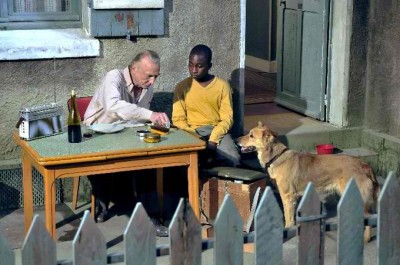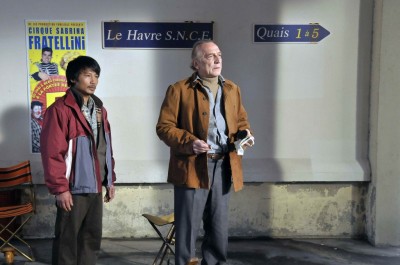
You may remember Aki Kaurismäki’s Le Havre by virtue of it being on the Fine Arts’ “coming soon” list at the end of 2011. What you do not remember is actually seeing the film since it never opened here. That was a great pity, because this disarming comedy-drama was easily one of the best films of the year. It also — assuming it was possible to get people to see it (sometimes an impossible task) — had the potential for being one of those crowd-pleaser art titles that grew on its audience over a period of time. A sweetly human and humane film, Le Havre is a work that has everything to recommend it and nothing — apart from subtitles and a lack of easily marketed names — working against it. Its shaggy, often improbable story has an immediate appeal that only grows as the film moves along in its almost defiantly old-fashioned way. There’s nothing flashy about it even though Kaurismäki slyly gooses near everything with subtle cinematic touches that are likely to go unnoticed, but not unresponded to by his audience. It’s the kind of movie that can be called “feel good” without any sense of derision due to its utterly deadpan presentation.

The film establishes its playful approach in the very first scene where friendly, but competitive shoeshine operators Marcel Marx (Andre Wilms) and Chang (Quoc-Dung Nguyen) vie for customers in the Le Havre train station. Marcel lucks out by scoring a mysterious man with a briefcase handcuffed to his wrist. But when suspicious-looking characters show up, the man rushes out of frame and gunshots are heard offscreen. Chang expresses regret over the man’s fate. Marcel merely notes pragmatically that at least he had time to pay for his shine. This turns out to be typical of Marcel who is generally self-serving and self-satisfied. (When it’s pointed out that his wife is too good for him, he reasons that she’s too good for anybody, so he’ll do.) This changes, however, when Marcel befriends a young illegal immigrant, Idrissa (Blondin Miguel) — an event that happens to coincide with his wife’s (Kati Outinen) sudden hospitalization for cancer.
Almost nothing proceeds in the manner we expect, but everything proceeds in a manner that proves perfectly right at every turn. Realistically, we might reject much of what happens as far-fetched, but emotionally, it’s just plain irresistible.




The long-awaited review!
Loved this film as well. Deadpan to the max; funny without trying. Even the musical number is pleasant in its own odd way.
Its odd and charmingly economical way.
Kaurism
While I agree with that, I hasten to add I wouldn’t want a steady diet of it. (Of course, then it wouldn’t be refreshing.)
I wouldn’t want a steady diet of it.
Agreed. Keep it sparse, keep it special.